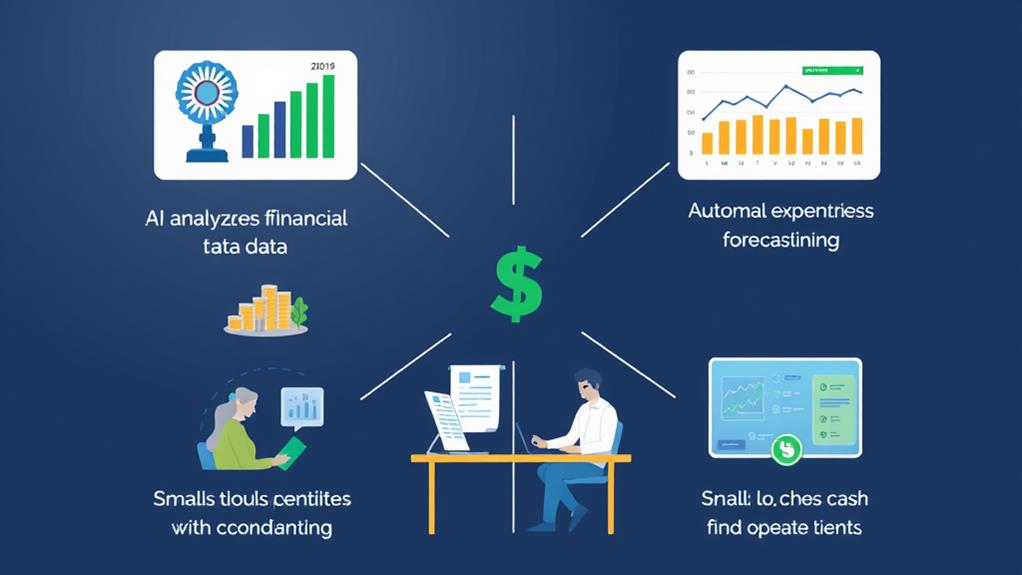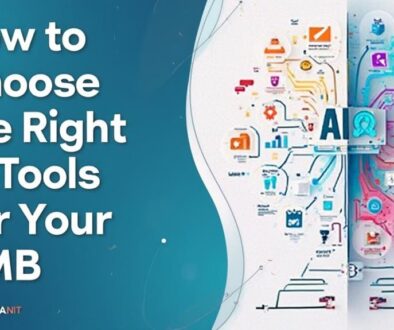The Role of AI in SMB Financial Management
The role of AI in small and medium-sized business (SMB) financial management is increasingly essential. AI enhances efficiency by automating routine tasks such as invoice processing and payroll, reducing administrative overhead. Through advanced data analytics, AI provides real-time insights that improve cash flow management and facilitate precise budgeting. Additionally, AI fosters enhanced financial forecasting and risk management by identifying trends and anomalies in financial data. This integration cultivates a data-driven strategic environment, enabling SMBs to make informed decisions rapidly. As AI technologies evolve, they promise further transformation in the financial landscape, indicating exciting developments ahead.
Key Takeaways
- AI automates routine financial tasks like invoice processing and payroll, leading to significant cost savings for SMBs.
- Predictive analytics powered by AI enhances financial forecasting accuracy, enabling better cash flow management and strategic planning.
- Machine learning algorithms streamline budgeting processes, allowing for real-time adjustments and improved accuracy in financial projections.
- AI boosts financial transparency and stakeholder trust by providing real-time insights and automating expense tracking and reconciliation.
- Enhanced risk management using AI involves real-time evaluations and fraud detection, improving compliance monitoring and credit scoring for SMBs.
Understanding AI in Finance

In the domain of financial management, the integration of artificial intelligence (AI) is rapidly reshaping traditional practices, offering unprecedented capabilities for small and medium-sized businesses (SMBs). AI technologies, particularly machine learning algorithms, enhance decision-making support, enabling SMBs to analyze vast datasets with accuracy and speed. This evolution not only streamlines investment strategies but also fosters financial transparency, a critical element for modern enterprises aiming to build trust with stakeholders.
However, the implementation of AI in finance carries substantial responsibilities. AI ethics must be at the forefront of development to mitigate algorithm bias, ensuring that automated systems do not perpetuate discriminatory practices. This concern is particularly pertinent when AI solutions influence talent acquisition and other strategic processes.
Additionally, safeguarding data security is paramount, as vulnerabilities could undermine both organizational integrity and client confidence. Regulatory compliance remains another critical issue, as SMBs navigate an increasingly complex legal landscape requiring adherence to local and international standards.
Successful incorporation of AI solutions hinges on a positive user experience, which involves intuitive interfaces and access to robust support systems. As SMBs leverage AI technologies, they must weigh the benefits of advanced analytics against potential risks, ensuring they maintain ethical considerations alongside financial goals.
Ultimately, understanding AI in finance not only enhances operational effectiveness but also empowers businesses to operate within the frameworks of accountability and integrity that customers and regulators expect.
Benefits of AI for SMBs
While many small and medium-sized businesses (SMBs) face resource constraints that limit their financial management capabilities, the adoption of artificial intelligence (AI) presents transformative advantages that can boost efficiency and decision-making.
Specifically, AI technologies facilitate cost savings by automating repetitive financial processes, enabling SMBs to allocate their limited resources towards growth opportunities.
One key benefit of AI is its ability to enhance cash flow management. By providing real-time insights into financial transactions, businesses can optimize their resource allocation, ensuring funds are available when needed. This proactive approach to financial management improves operational efficiency, allowing SMBs to maintain clearer visibility into their financial health.
Furthermore, AI technologies support strategic planning by enabling data-driven decision making. Advanced analytics can highlight trends and risks, empowering business leaders to make informed choices that bolster their competitive advantage.
This capability not only streamlines workflow optimization but also enhances financial literacy among employees, fostering a culture of informed decision-making throughout the organization.
As SMBs increasingly adopt these technologies, they position themselves to benefit from transformative operational efficiencies. Adopting AI in finance can lead companies to access sophisticated forecasting models and budgeting tools that were previously out of reach, creating a more agile and responsive business model.
To summarize, the strategic implementation of AI can redefine financial management for SMBs, catalyzing growth, improving performance, and establishing a solid foundation for future endeavors.
Automating Routine Financial Tasks

The implementation of AI technologies not only enhances cash flow management and strategic planning but also plays a pivotal role in automating routine financial tasks that are often burdensome for SMBs. By streamlining processes such as invoice processing and payroll automation, organizations can allocate resources more efficiently and focus on growth-oriented activities.
AI-driven invoice processing notably reduces administrative overhead by automating data entry and approval workflows. This not only accelerates cash flow but also minimizes errors associated with manual input.
In addition, payroll automation through AI removes the complexities of payroll calculations and compliance with tax regulations, ensuring accurate and timely employee payments while maintaining full tax compliance.
In addition to the aforementioned tasks, AI assists in financial auditing and reconciliation processes. Utilizing intelligent algorithms, businesses can continuously monitor transactions, detect discrepancies, and categorize expenses swiftly, which enhances overall financial integrity.
The integration of AI into vendor management systems promotes better relationships by automating communications and payments, ensuring timely processing.
With advanced budgeting tools, AI empowers SMBs to forecast operational costs and allocate resources effectively, refining their expense reporting processes. These innovations permit fine-tuned transaction categorization, enabling detailed analytics that help in informed decision-making.
Enhancing Financial Forecasting
Accurate financial forecasting is crucial for small to medium-sized businesses (SMBs) seeking sustainable growth and competitive advantage. Leveraging artificial intelligence (AI) empowers SMBs to enhance forecasting accuracy through sophisticated analytical capabilities. This leads to informed, data-driven decisions that drive strategic planning.
AI's role in financial forecasting can be illustrated through key components:
- Historical Analysis: AI tools analyze past data to identify patterns that inform future expectations.
- Market Trends: Continuous monitoring of economic indicators and market fluctuations enables timely adjustments in forecasts.
- Scenario Modeling: AI facilitates the creation of various financial scenarios, allowing businesses to prepare for differing market conditions.
- Cash Flow Projections: Improved forecasts sharpen cash flow management, essential for operational sustainability.
- Precision Analytics: AI algorithms refine predictions by incorporating a wide array of data sources and statistical methods.
By utilizing these capabilities, SMBs can markedly enhance forecasting accuracy, creating actionable insights that inform strategic objectives.
The integration of historical analysis with ongoing economic indicators equips businesses to navigate uncertainties more effectively.
Furthermore, scenario modeling guarantees that companies remain agile, ready to pivot in response to market shifts.
Improving Budgeting Processes

In light of the evolving financial landscape, small to medium-sized businesses (SMBs) must embrace enhanced budgeting processes to guarantee robust fiscal health and agility. Traditional budgeting methods often fail to capture the dynamic nature of today's market, leading to misallocated resources and missed opportunities.
The integration of AI budgeting tools can revolutionize this process, providing SMBs with the capacity to implement effective budget optimization strategies that align with their growth objectives.
AI budgeting tools streamline budget creation by automatically analyzing historical data, identifying patterns, and forecasting future financial needs. By leveraging machine learning algorithms, these tools refine budget estimates, allowing for real-time adjustments based on fluctuating market conditions and operational variations.
This data-driven approach not only increases the accuracy of budgeting efforts but also enhances strategic decision-making.
Furthermore, AI-powered solutions facilitate scenario analysis, enabling SMBs to evaluate the implications of various financial strategies. This capability fosters a proactive budgeting environment, where companies can explore the financial consequences of potential investments or cost-cutting measures without the lengthy deliberations typically associated with traditional methods.
Ultimately, the deployment of AI in budgeting processes empowers SMBs to cultivate greater financial flexibility and responsiveness. As organizations navigate the complexities of modern business, adopting these advanced methodologies will become essential in driving efficiency, optimizing resource allocation, and securing a competitive advantage.
AI-Powered Data Analysis
AI-powered data analysis is revolutionizing how SMBs streamline financial insights and enhance decision-making processes.
By automating expense tracking, businesses can achieve greater accuracy and efficiency in their financial reporting, thereby reducing the potential for human error.
Additionally, the integration of predictive analytics provides valuable foresight, enabling companies to make informed strategic decisions based on data-driven forecasts.
Streamlining Financial Insights
Frequently, small and medium-sized businesses (SMBs) encounter challenges in extracting actionable financial insights from vast amounts of data. AI-powered data analysis offers a transformative approach to streamline this process, enabling organizations to gain clarity in their financial landscape. Through advanced algorithms and machine learning techniques, SMBs can harness true financial intelligence.
Key benefits of AI-driven insights include:
- Enhanced Data Visualization: Transforming raw data into intuitive graphs and charts.
- Improved Cash Flow Analysis: Predicting trends and identifying fluctuations in revenue and expenses.
- Real-Time Reporting: Generating up-to-date financial reports for timely decision-making.
- Automated Anomaly Detection: Identifying inconsistencies or unusual patterns in financial data.
- Predictive Analytics: Forecasting future financial scenarios based on historical data.
Harnessing these capabilities, SMBs can navigate the complexities of their financial operations with greater precision. By prioritizing the integration of AI in financial management, they are empowered to not only monitor their cash flow effectively but also to make informed, strategic decisions that foster growth and sustainability.
The ability to visualize data and leverage predictive insights ultimately liberates SMBs from data overload, paving the way for financial clarity and operational excellence.
Automating Expense Tracking
Effective financial management extends beyond merely analyzing data; it also involves meticulous tracking of expenses. Automating expense tracking through AI-powered data analysis enhances expense categorization, allowing small and medium-sized businesses (SMBs) to streamline their financial processes. This technology facilitates automatic transaction reconciliation, ensuring that every entry aligns with bank statements, thereby improving budgeting accuracy.
With improved receipt management, AI assists in organizing and storing receipts efficiently, which is vital for vendor management and financial transparency. Automating these processes not only saves time but also enhances audit readiness—key for financial compliance in an increasingly regulated environment.
Moreover, AI-driven expense reporting tools provide real-time insights into cash flow, enabling SMBs to make informed decisions that can optimize their budgets. By delivering precise data analytics and minimizing human error, these automated systems help businesses maintain financial integrity.
Ultimately, leveraging AI to automate expense tracking empowers business leaders with greater freedom to focus on strategic initiatives, leading to improved operational efficiency and enhanced financial performance. In this era of digital transformation, employing AI technology in financial management is no longer an option but a necessity for success.
Predictive Analytics Benefits
Leveraging predictive analytics enables small and medium-sized businesses (SMBs) to anticipate future financial outcomes with greater precision. By analyzing historical data and current market indicators, SMBs can derive insights that help in maneuvering through complex financial landscapes.
The benefits of employing predictive analytics include:
- Enhanced Sales Forecasting: Predictive models facilitate accurate projections of sales trends based on customer behavior and market fluctuations.
- Improved Cash Flow Management: By understanding expense patterns, businesses can optimize their cash flow, ensuring operational efficiency.
- Informed Investment Analysis: Predictive insights engine business leaders' decisions around potential growth opportunities and strategic investments.
- Proactive Financial Health Assessment: Tracking economic indicators allows SMBs to assess their financial health and make necessary adjustments to maintain stability.
- Identifying Market Trends: Recognizing emerging shifts in consumer habits empowers businesses to adapt their strategies accordingly.
Risk Management Through AI

The integration of artificial intelligence in risk management is transforming how small and medium-sized businesses (SMBs) approach potential threats to their operations and finances. By leveraging advanced AI algorithms, SMBs can conduct real-time risk evaluations that analyze myriad data sources, aiding in the early identification of potential vulnerabilities or financial setbacks.
Through enhanced fraud detection capabilities, AI systematically monitors transactions, thereby greatly reducing the risk of financial losses and increasing trust among stakeholders. In addition, AI strengthens compliance monitoring efforts by automatically ensuring that all financial activities adhere to current regulations, minimizing the risk of penalties or legal repercussions.
Scenario analysis powered by AI allows SMBs to simulate various risk conditions and outcomes, providing insights that inform essential decision-making processes. This capability is instrumental in refining investment strategies, enabling businesses to approach market fluctuations with data-backed confidence.
Additionally, AI enhances credit scoring models, allowing for improved risk evaluation by considering both traditional and alternative data points, which can lead to better lending decisions.
In the area of insurance underwriting, AI streamlines operations by evaluating risk profiles more accurately, allowing SMBs to secure the right coverage at competitive rates. The ability to swiftly process vast quantities of information in risk management not only empowers SMBs to safeguard their financial interests but also enhances their agility in maneuvering complex markets.
Embracing AI for these functions is no longer a luxury but an essential component in securing the freedom crucial for sustainable growth and stability.
Future Trends in AI Finance
As the financial landscape evolves, predictive analytics advancements are set to enhance the accuracy of financial forecasting for small and medium-sized businesses (SMBs).
Automated reporting solutions will streamline compliance and operational efficiency, allowing financial teams to allocate resources more effectively.
Together, these trends indicate a shift towards data-driven decision-making that could greatly impact financial management in the SMB sector.
Predictive Analytics Advancements
Emerging advancements in predictive analytics are poised to revolutionize financial management for small and medium-sized businesses (SMBs) in unprecedented ways. By harnessing the power of machine learning and cutting-edge algorithms, these tools empower SMBs to refine their financial strategies with enhanced accuracy and foresight.
Key advancements include:
- Trend Analysis: Identifying patterns in historical financial data to forecast future performance.
- Customer Segmentation: Categorizing clients based on behavioral data to optimize marketing and service efforts.
- Financial Modeling: Creating robust models that simulate various financial scenarios and their impacts.
- Anomaly Detection: Detecting unusual patterns or discrepancies in financial data to mitigate risks.
- Data Visualization: Leveraging intuitive dashboards for enhanced decision-making capabilities.
These innovations not only facilitate effective scenario planning but also enable algorithm optimization for continuous benchmarking performance.
Additionally, predictive analytics serve as powerful tools for market forecasting, allowing small and medium-sized enterprises to adapt swiftly in an increasingly volatile environment.
Automated Reporting Solutions
Advancements in automated reporting solutions are fundamentally reshaping the landscape of financial management for SMBs, streamlining processes and enhancing accuracy.
These solutions leverage automated dashboards and real-time analytics to provide immediate insights into financial performance, allowing businesses to pivot quickly and make informed decisions.
The availability of customizable reports enables organizations to tailor their financial data visualization according to their specific needs, ensuring that critical performance metrics are highlighted effectively.
Enhanced integrated solutions facilitate seamless data flow between various platforms, ensuring that the information drawn upon for reporting is cohesive and all-encompassing.
User-friendly interfaces simplify the complex data navigations traditionally associated with financial reporting, empowering employees at all levels to access and interpret essential financial information without advanced technical skills.
In addition, these automated solutions contribute notably to compliance tracking, providing SMBs with assurance that financial regulations are met while enhancing financial transparency.
Frequently Asked Questions
How Much Does AI Financial Management Software Typically Cost for Smbs?
The cost of AI financial management software for small to medium-sized businesses (SMBs) varies considerably based on pricing models, which may include subscription, pay-per-use, or tiered pricing structures.
Typically, costs range from $30 to $300 per month, depending on features and scalability.
Organizations must carefully assess the cost benefits, as investing in such technology can lead to improved efficiency, reduced errors, and enhanced financial insights, ultimately facilitating better decision-making and freeing resources for growth.
What Are the Top AI Tools for Small Business Financial Management?
Steering small business financial management is akin to sailing a ship through tumultuous waters, where clarity and direction are paramount.
Top AI tools such as QuickBooks and Xero excel in automated invoicing, streamlining billing processes and enhancing cash flow.
Additionally, Expensify and Zoho Expense offer robust expense tracking capabilities, providing insightful analytics that empower business owners to make data-driven decisions.
These tools collaboratively foster greater financial freedom, allowing small enterprises to thrive amidst complexity.
Is AI in Finance Secure Against Data Breaches and Cyber Threats?
The security of AI in finance is contingent upon thorough measures, including data encryption and robust user authentication protocols.
Regular risk assessments must align with compliance standards to mitigate vulnerabilities.
An effective incident response strategy is essential for minimizing damage from potential breaches.
Additionally, advanced threat detection technologies are crucial for proactively identifying and neutralizing cyber threats, ensuring the safety of sensitive financial information in a rapidly evolving digital landscape.
How Can SMBS Transition to Ai-Driven Financial Management Smoothly?
To guarantee a smooth shift to AI-driven financial management, SMBs should implement robust AI adoption strategies that prioritize financial data integration.
This involves mapping out existing data flows, identifying legacy systems, and selecting compatible AI tools that enhance operational efficiency.
Continuous employee training is essential to fostering confidence in using AI solutions, while establishing clear metrics to evaluate the effectiveness of these technologies will empower organizations to remain agile and responsive in a rapidly evolving landscape.
What Skills Are Needed for Employees Working With AI Financial Tools?
Imagine sailing a ship equipped with advanced navigational tools; proficiency with these instruments is essential for smooth sailing.
Employees working with AI financial tools must develop skills in data analysis to interpret complex datasets effectively.
Additionally, understanding software integration is vital for seamless connectivity between different systems.
Together, these skills empower teams to harness technology's full potential, enhancing decision-making, optimizing processes, and ultimately revolutionizing how organizations manage their financial landscape.
Conclusion
The integration of artificial intelligence in financial management for small and medium-sized businesses heralds a transformative era akin to the dawn of the industrial revolution. With its capabilities in automating routine tasks, enhancing forecasting precision, and refining budgeting processes, AI markedly alters the landscape of financial operations. As risk management evolves through sophisticated data analysis, the future for SMBs remains bright, illuminated by the promise of AI-driven efficiency and informed decision-making, ensuring stability and growth in an ever-changing marketplace.




